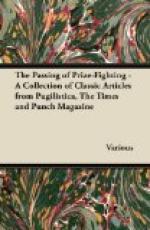Mrs. T.P. O’CONNOR has written a fascinating book. My Beloved South she calls it, and PUTNAMS publish it. There is not a lifeless page in the 427 that make up a bountiful feast. Every one contains vivid reproductions of incidents in social life in the South “befo’ de wa’” and after. At the outset we make the acquaintance of a typical Southron, Mrs. O’CONNOR’s grandfather, Governor of Florida when it was still a Territory, with native Indians fighting fiercely for their land and homes. Mrs. O’CONNOR was, of course, not to the fore in those early days. But so steeped is she in lore of the South, much of it gained from the lips of nurses and out-door servants, so keen is her sympathy, so quick and true her instinct that she is able to revivify the old scenes and reproduce the atmosphere of the time. The darkey nurse of earliest childhood lives again, sometimes bringing with her plantation songs like “Voodoo-Bogey-Boo,” quaintly musical. Many passages of the grandfather’s conversations are preserved, in which we may detect the voice of the gifted granddaughter. But the influence of heredity is strong, more especially “down South.” Also there are many charming stories redolent of the South. I was about to mention the page on which will be found the thrilling history of a mule aptly named “Satan.” On reflection I won’t spoil the reader’s pleasure in unexpectedly coming upon it somewhere about the middle of the book. Nobody—man or woman, girl or boy—who begins to read My Beloved South will skip a page. So the story cannot be overlooked.
* * * * *
In Lost Diaries (DUCKWORTH) Mr. MAURICE BARING travels by an easy road to humour, and he does not pound it with too laborious feet. This is perhaps a fortunate thing, for a farcical reconstruction of history in the light of modern sentiment and circumstances might easily tire; a Comic History of England, for instance, is stiffer reading to-day than GARDNER or GREEN. Sometimes, however, Mr. BARING seems to carry to extreme lengths his conscientious avoidance of efforts to be funny; and in the imaginary records of one or two of his subjects there is little more to laugh at than the unaided fancy of the student has long ago perceived. Tristram loved two Iseults, and JOHN MILTON was an exasperating husband; but these things I knew, and the author of Lost Diaries has made no more capital out of the situations than the eternal merriment which the bare statement of the facts inspires. But where Mr. BARING, pleasantly disdainful alike of consistency and taste, examines the pocket-book of the “Man in the Iron Mask,” and finds him complaining of the noise and disturbance in dungeon after dungeon until he is removed at last to the lotus island of the Bastille; or records the blameless botanical pursuits of TIBERIUS in seclusion; or the first consumption of the Colla di Gallo by COLUMBUS in the newly discovered West, he is, for all the simplicity of his methods, amusing enough. Yet even so I am inclined to think that the first of his essays, which reads like an actual transcript from the jottings of a nineteenth-century private-school boy, is the diary which I most heartily congratulate Mr. BARING on having rediscovered, and which I should be least willing for him to lose again.




